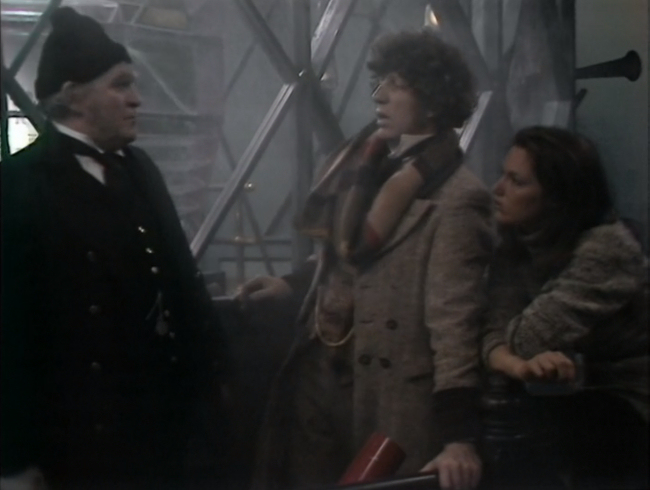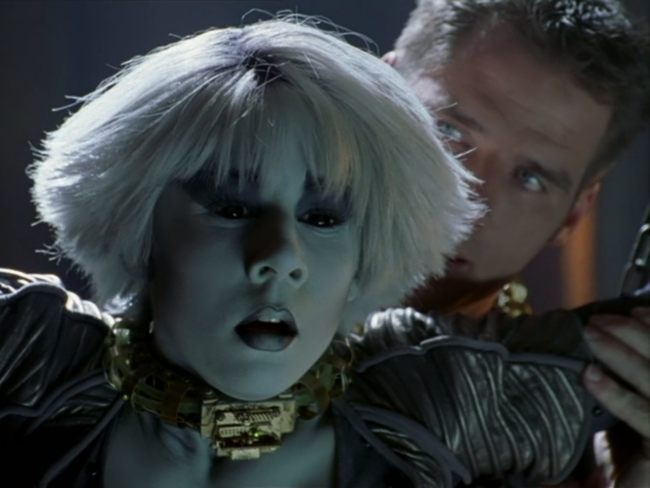
A call back to some of the best makeup and puppet work from Farscape's first season happens when Crichton decides to assemble a team for another raid on the Shadow Depository, this time to rescue D'Argo's son.

Season 2, Episode 20: Liars, Guns, and Money part II: With Friends Like These . . .
The previous episode ended with the crew making off with a lot of loot, ready to bid at the slave auction where D'Argo's son is being held. But when they arrive, they find Scorpius (Wayne Pygram) has beat them to it. He offers a deal--Crichton (Ben Browder) for D'Argo's son, Jothee (Matt Newton).
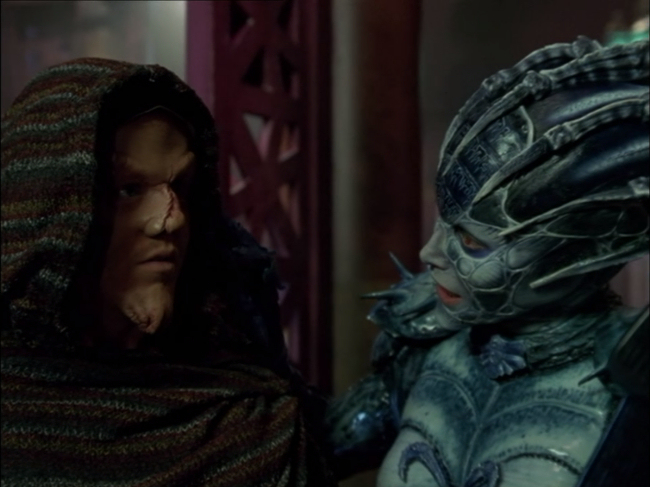
After being introduced in the first season through flashback, and appearing in a couple more flashbacks and images, Jothee finally properly enters the story here. In the clutches of Scorpius and Natira (Claudia Karvan), he receives some verbal abuse from Braca (David Franklin), Scorpius' second in command, for being a half-breed. Scorpius overhears the remark and asks Braca if he has a problem with half-breeds--a good question, considering Scorpius is himself half Scarran and half Sebacean.

More precisely, as Natira puts it with a kind of sinister feigned innocence, Scorpius' Sebacean mother was raped by his Scarran father--she asks Jothee if that was the same in his case. There's an interesting powerplay behind the way racism is used in conversation here. First Braca reflexively attempts to intimidate Jothee with the typical Peacekeeper attitude about race, then Scorpius knocks Braca off-balance by rejecting the premise of his racism--this functions as a casual display of dominance for Scorpius. And then Natira, an alien herself, picks up on the subtext and makes it clear to Jothee that she'll buy into the idea of half-breeds being the inevitable product of rape by brutish aliens. It makes no sense which is also part of the intimidation tactic--Scorpius and Natira walk into the room and they immediately take control of all of the logic.
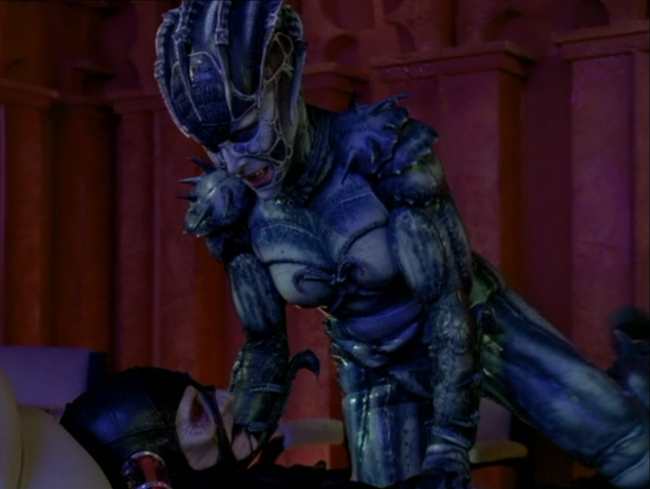
This is another episode written by Naren Shankar, whose previous episode, "The Way We Weren't", dealt heavily with indoctrinated Peacekeeper ideas of racial identity. Now he brings the idea to D'Argo and his family. Anthony Simcoe as D'Argo gives a surprisingly passionate performance in a scene where he tells Chiana (Gigi Edgley) how close he came to trading Crichton for Jothee. "Crichton is your friend," says Chiana. But Jothee, replies D'Argo, "is my blood. Why isn't that enough?"

This is a marker of how far the crew's relationships have evolved since the first season. In the beginning, most of the crew would probably have sold out any other member of the crew in an instant for the chance of being reunited with their family, home, or people. But the crew of Moya no longer operate on that level alone--they have become a family.
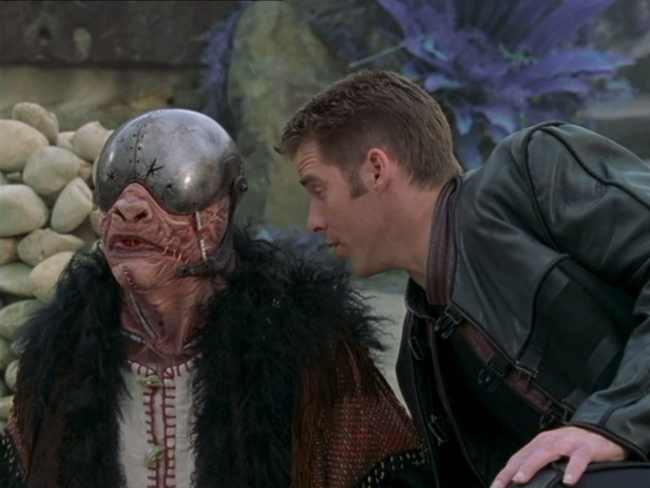
Meanwhile, the loot turns out to be an infestation of metal eating bugs, an inconvenience since Crichton, Aeryn (Claudia Black), Rygel (Jonathan Hardy), and D'Argo are each alone rounding up cohorts for a raid on the Shadow Depository and these mercenaries need to be paid somehow. Aeryn tracks down one of the more impressive aliens from season one, the fire-breathing Sheyang.

This all starts to come together into a nice Dirty Dozen/Ocean's 11 style plot. In the process, Rygel finally gets his revenge on Durka (David Wheeler). One needs to remember just how long Durka tortured Rygel--around a hundred cycles, if I remember right. It's a sudden and unexpected bit of catharsis for the little Dominar and, as we'll see later, he's happy to carry the memento.
. . .
Farscape is available now on Amazon Prime.
This entry is part of a series I'm writing on Farscape for the show's 20th anniversary. My previous reviews can be found here (episodes are in the order intended by the show's creators rather than the broadcast order):
Season One:
Episode 1: Pilot
Episode 2: I, E.T.
Episode 3: Exodus from Genesis
Episode 4: Throne for a Loss
Episode 5: Back and Back and Back to the Future
Episode 6: Thank God It's Friday Again
Episode 7: PK Tech Girl
Episode 8: That Old Black Magic
Episode 9: DNA Mad Scientist
Episode 10: They've Got a Secret
Episode 11: Till the Blood Runs Clear
Episode 12: Rhapsody in Blue
Episode 13: The Flax
Episode 14: Jeremiah Crichton
Episode 15: Durka Returns
Episode 16: A Human Reaction
Episode 17: Through the Looking Glass
Episode 18: A Bug's Life
Episode 19: Nerve
Episode 20: The Hidden Memory
Episode 21: Bone to be Wild
Episode 22: Family Ties
Season Two:
Episode 1: Mind the Baby
Episode 2: Vitas Mortis
Episode 3: Taking the Stone
Episode 4: Crackers Don't Matter
Episode 5: Picture If You Will
Episode 6: The Way We Weren't
Episode 7: Home on the Remains
Episode 8: Dream a Little Dream
Episode 9: Out of Their Minds
Episode 10: My Three Crichtons
Episode 11: Look at the Princess, Part I: A Kiss is But a Kiss
Episode 12: Look at the Princess, Part II: I Do, I Think
Episode 13: Look at the Princess, Part III: The Maltese Crichton
Episode 14: Beware of Dog
Episode 15: Won't Get Fooled Again
Episode 16: The Locket
Episode 17: The Ugly Truth
Episode 18: A Clockwork Nebari
Episode 19: Liars, Guns, and Money, Part I: A Not So Simple Plan




